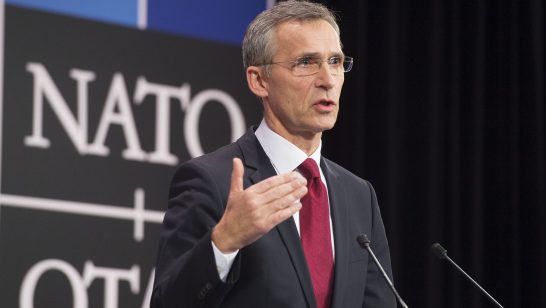
EU defence is suddenly on the European agenda and it may soon have an unlikely, yet vital, champion: the United States.
To the surprise of many, the long-delayed call between President Biden and French President Emmanuel Macron, meant to patch things up after the fallout over Australia’s decision to cancel its submarine contract with France, appeared to work. But how?
There was one line in the readout of the call that caught the attention of many Europe watchers here in the US: “The United States also recognizes the importance of a stronger and more capable European defense, that contributes positively to transatlantic and global security and is complementary to NATO.” On social media, a debate emerged as to whether this was actually significant. Some astute observers noted that this line was nothing new and that the US had used very similar language in other recent statements. Hence, no real change to America’s approach.
But this is almost certainly incorrect. The tell is the French reaction to the call. France immediately sent back their recalled Ambassador to Washington and simmered down its boiling ire. Boilerplate American talking points about the EU and NATO would not have soothed France. The call worked because the US was receptive to French objectives and concerns.
Washington is eager tone down the row with Paris, and EU defence is an obvious place for the US to shift its approach. Few in Washington think the present status quo in European security works or advances America’s interests.There is also no allergy to the EU or EU defence amongst top Biden officials — this is not the Trump administration. Secretary of State Antony Blinken twenty years ago even endorsed EU defence in a Brookings paper.
But even if the administration was open to shifting America’s approach to EU defence upon coming to office, changing US policy is never easy. This is especially true when that policy has been in place for more than 20 years and is strongly defended inside the US government by career officials. Their concerns are not easy to dismiss, particularly for an administration intent on demonstrating respect for career officials pilloried during the Trump administration. Furthermore, to overrule the State and Defense departments and plot a new course would require a concerted effort from President Biden on down to effectively mandate this change. This would consume precious time and energy from domestic and foreign policy priorities and would prove difficult to implement without a full team of Senate-confirmed officials in place.
But the AUKUS fallout has had the bizarre effect of shifting America’s focus from Asia to Europe. The row with France was the rare foreign policy story that penetrated domestic headlines in the US. Suddenly, the administration was forced to focus on France’s concerns. Thus, the high-level attention needed to shift US policy dramatically materialized.
A timeline for significant action on EU defence is now emerging; Biden and Macron will meet in late October. Should President Biden endorse Macron’s efforts to build EU defence capabilities and encourage other EU members to get on board, it will create tremendous momentum for the EU defence summit that Macron is hosting during the French presidency of the EU in 2022. Additionally, the departure of Merkel and a new German coalition may add further momentum, as the Social Democrats, Greens, and Free Democrats all conceptually support an EU defence or security union. Additionally, there is clear public enthusiasm, as EU defence has consistently polled above 70 percent, and Afghanistan and AUKUS have created a sense in Europe that action is needed.
But this raises the question, what exactly is the EU proposing? Consistent US opposition has chilled EU defence ambitions. Knowing that any bold EU proposal will be opposed by the US and its close security allies in the EU, there was little point in proposing anything bold or specific. Hence, a bizarre situation has formed. Debates over EU defence have become highly theoretical, involving vague and grandiose notions of “strategic autonomy,” while actual EU defence efforts are highly technical endeavours, involving discrete projects and industrial collaboration, unlikely to elicit America’s ire.
But with the US suddenly paying attention and potentially ready to back a bold, ambitious defence proposal, the EU needs to come up with something tangible for America to get behind. National Security Advisor, Jake Sullivan, recently made this clear on his travels in Brussels, when he encouraged Europe to get “practical and specific… and then for the United States to be supportive of that.”
To make any progress, the EU and France, in particular, will need to alleviate concerns that this will undermine or duplicate NATO or lead to Europe separating from America. Simply replicating NATO’s structure for the EU and encouraging coordination between EU members will be a non-starter for the US and others. EU defence will need to add capabilities and make Europe stronger. The EU could go in a variety of directions. It could focus on filling tangible military gaps, such as developing the ability to deploy and operate forces without relying on US military assets. It could seek to emulate the enabling capabilities that the US provides for missions in the Sahel or humanitarian evacuations at Hamad Karzai International Report. This would mean working to procure real capabilities, such as fleets of enabling assets, transport and tanker aircraft or developing intelligence and surveillance capabilities. Alternatively, the EU could pool resources and focus on acquiring a few select higher-end defence capabilities that are beyond the financial capacity of most member states, such as air and missile defence capabilities.
Should the EU actually acquire and build its own defence capacity, it will also force a reckoning of the EU’s democratic deficit and its unwieldy foreign policy structure. For instance, who directs the EU force and acts as its commander in chief? But not every decision must be worked out right away. That is not the way EU integration has worked in the past.
The thorniest question will be the money. Who pays, and where will it come from? It is easy for savvy EU watchers to throw up their hands and say it is all too much and will never happen. That is indeed the safer bet, and it is hard to see member states agreeing to massively increase national contributions to an EU pot of money. But in March 2020 few thought it possible that the EU would develop an €800 billion recovery package financed through EU borrowing. There is now no reason why the EU couldn’t borrow more to kick start an ambitious defence agenda or encourage additional member state contributions. Such financing would also act as a direct industrial stimulus that would go to European defence companies, helping to boost European economies and post-pandemic economic recovery. EU defence could thus have an impact on broader EU discussions of fiscal union and EU owned resources.
The stars may be aligning for bolder action. After a decade of crises and stagnation, ambition is returning to the EU, as seen by its bold action on climate and digital regulation. With the potential for US backing and engagement, now is the time for the EU to act on defence. After all, American support may not last.
The opinions articulated above represent the views of the author(s) and do not necessarily reflect the position of the European Leadership Network (ELN) or any of its members. The ELN’s aim is to encourage debates that will help develop Europe’s capacity to address the pressing foreign, defence, and security policy challenges of our time.
Image: Flickr, European Council President



